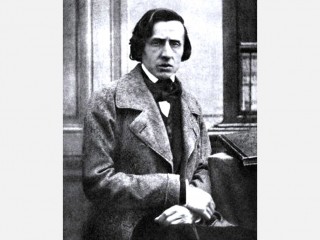
Frédéric Chopin biography
Date of birth : 1810-03-01
Date of death : 1849-10-17
Birthplace : Warsaw, Poland
Nationality : Polish
Category : Arts and Entertainment
Last modified : 2010-04-08
Credited as : Polish composer and pianist, composing piano sonatas and ballades, Piano Concerto No. 1 in E minor
2 votes so far
Chopin was born in the village of Żelazowa Wola, in the Duchy of Warsaw, to a French-expatriate father and Polish mother. He was considered a child-prodigy pianist. At an early age, Chopin displayed artistic talents—he was an artist, wrote poetry, and played piano without any formal instruction. The gifted child also began composing his own music and had his first piece of music published when he was just seven years old.
Young Chopin had a good education and later studied music privately with Joseph Elsner, founder and director of the Warsaw Conservatory. In 1817 Chopin's first composition was performed publicly. A year later he himself performed in public, playing a concerto (music written for one or more instruments) by Adalbert Gyrowetz. By this time the young Chopin began drawing comparisons to Wolfgang Amadeus Mozart (1756–1791), another composer who had demonstrated spectacular talent at a young age.
Back in Warsaw, in 1829, Chopin heard Niccolò Paganini play and met the German pianist and composer Johann Nepomuk Hummel. In August the same year, three weeks after completing his studies at the Warsaw Conservatory, Chopin made a brilliant debut in Vienna. He gave two piano concerts and received many favorable reviews — in addition to some that criticized the "small tone" that he drew from the piano. This was followed by a concert, in December 1829, at the Warsaw Merchants' Club, where Chopin premièred his Piano Concerto No. 2 in F minor, Op. 21, and by his first performance, on 17 March 1830, at the National Theater, of his Piano Concerto No. 1 in E minor, Op. 11. In this period he also began writing his first Études (1829–1832).
Chopin's successes as a performer and composer opened the professional door for him to western Europe, and on 2 November 1830, seen off by friends and admirers, with a ring from Konstancja Gładkowska on his finger and carrying with him a silver cup containing soil from his native land, Chopin set out, writes Jachimecki, "into the wide world, with no very clearly defined aim, forever."
At the age of 20, on 2 November 1830, he left Warsaw for Austria, intending to go on to Italy. The outbreak of the Polish November Uprising 27 days later, and its subsequent suppression by the Russian Empire, led to his becoming one of many expatriates of the Polish Great Emigration.
Frederic Chopin - Nocturne In E Flat Major, Op.9 No.2 :
In Paris, Chopin made a comfortable living as a composer and piano teacher, while giving few public performances. Though an ardent Polish patriot, in France he used the French versions of his given names and traveled on a French passport, possibly to avoid having to rely on Imperial Russian documents. After ill-fated romantic involvements with Polish women, from 1837 to 1847 he had a turbulent relationship with the French novelist Aurore Dupin, better known by her pseudonym, George Sand. For the greater part of his life Chopin suffered from poor health; he died in Paris in 1849, aged thirty-nine, of pulmonary tuberculosis.
The great majority of Chopin's compositions were written for the piano as solo instrument. Though technically demanding, they emphasize nuance and expressive depth rather than sheer virtuosity. Chopin invented musical forms such as the instrumental ballade and was responsible for major innovations in the piano sonata, mazurka, waltz, nocturne, polonaise, étude, impromptu and prélude.
















